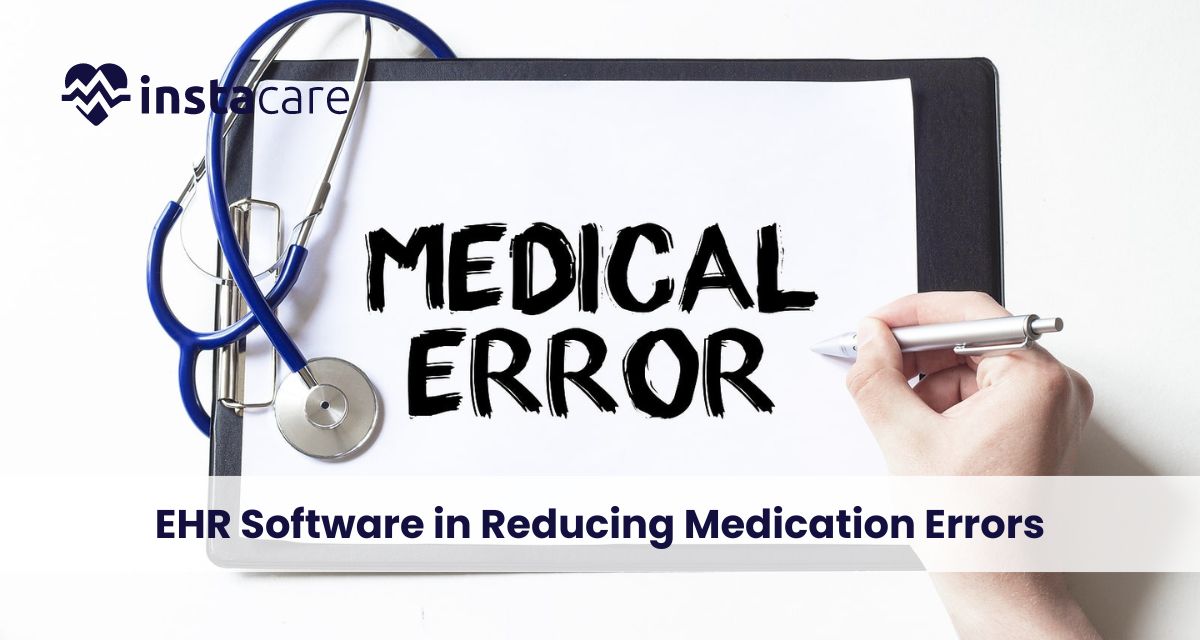Last updated on Monday, 24, June, 2024
Table of Contents
The Role of EHR Software in Reducing Medication Errors
With the introduction of Electronic Health Record, or EHR, software, healthcare has witnessed a sea change, more so in medication safety measures. Electronically capturing patient health information, EHR systems make sure emergency providers have pervasive access to accurate data that reduces the chance of medication errors.
Facilitated Prescription Management
Prescribing management gets reformed through EHR systems because all data concerning patient medication history along with other related information get consolidated. Healthcare professionals can quickly access all the relevant data of the patient, including past prescriptions or known allergies and possible drug interactions, before prescribing drugs to the patient. All the necessary information is gathered at one place so that the concerned healthcare experts can quickly go through it and make a well-informed decision. This reduces the possibility of prescribing errors and hence improves overall patient safety.
Time is saved and accuracy ensured as far as medication management is concerned by the lean process brought into play by the EHR system. Healthcare professionals will be able to give more time to the care of patients and less on administrative tasks if there is no need to scour through lines and pages of different paper records or numerous electronic systems.
Support For Decisions In Real Time
Among the most valuable features of EHR software, though is its capability to offer real-time decision support to healthcare providers themselves. The systems actually embed clinical guidelines and best practices in the prescribing workflow. They will identify adverse reactions to physicians with an alert or warning over drug interactions or dosage discrepancies. Empowered with the right information at the right time, EHRs enable proactive decision-making that reduces risks associated with medication errors and improves patient outcomes.
The ability of a real-time decision support tool to act proactively for the modern healthcare setting environment is crucial because, in this setting, a quick response to each critical information usually means the difference between effective treatment and possible harm for the patient.
Improved Communication And Coordination
Effective communication and coordination among health teams serves as the basis for avoiding medication errors and enhancing patient care outcomes. The EHR Software in Reducing Medication Errors will permit efficient information sharing between physicians, pharmacists, nurses, and other caregivers. This is because the platforms ensure real-time access to patients’ information, including current medications, treatment plans, and medical history. This particle of interoperability ensures healthcare team members are up to date with the trends and can efficiently collaborate in patient care.
EHR systems reduce the risk of medication errors that may result from misunderstandings or oversights by ensuring transparency in health care workflows and improving channels of communication. When health professionals are more coordinated, then transitions of care become very smooth with continuity for the patients remaining well maintained. This in turn, supports the adaptation of safer practices in the course of delivering the best possible health outcomes.
Automated Alerts And Reminders
EHR systems can contribute greatly to patient safety with automated alerts and reminders. These systems are designed to notify the healthcare providers on time about their important medication-related work. The notifications can be regarding renewal of medication, allergies of the patients, dosage change needs, or even more such drug interaction feasible. They avoid probable errors before their occurrence since EHRs notify the healthcare experts in real-time. This feature not only tightens the noose on the risk factor but also tightens the noose for medication-related challenges on the caregivers.
Also, automation reminders have an effect to critically improve patient safety, with timely interventions and proper adherence to set treatment guidelines. Medication administration accuracy and completeness are maintained by healthcare teams through reminder alerts, hence reducing the chances of adverse outcomes. The alertness proactive safety aspect of the EHR system creates the difference in prevention of medication errors and improvement in quality of health care generally.
Improved Patient Engagement With EHR Software in Reducing Medication Errors
One of the ingredients in realizing this good medication management and medication-adherence situation is patient engagement. EHR Software in Reducing Medication Errors ensures patient engagement by allowing the individual to access and have a record of his own personal health information. A patient can get complete information about his medication list, dose, and other ongoing treatment procedures. This brings to light more understanding of their current condition, the kind of treatment someone is undergoing, which in real sense allows them to take charge when it comes to managing their care.
Well-educated on their health, the patient will, therefore be better placed to keep on their prescribed drugs and keenly adhere to all treatment recommendations. This kind of enthusiastic involvement can significantly reduce medication errors and thereby enhance adherence to treatment that ultimately translates to improved health outcomes.
Data-Driven Insights And Continuous Improvement
Moreover, the EHRs have sophisticated data analysis tools that provide much worthwhile information on trends of medication usage, medication-adherence rates, and their impact on patient outcomes. Healthcare organizations apply these data to define trends, track weak points, and bring about targeted interventions. Providers can, use data-driven insights to make constant improvements to medication safety, but finally to deliver optimal care and patient safety.
This means that better analysis of comprehensive data sets places healthcare providers in a better capacitated position to tailor treatment plans to meet the individual needs of every single patient. From that point onward, quality of care and general patient-satisfaction is bound to improve through these improved medication management strategies. EHR systems are, therefore, useful in realizing continuous improvement in healthcare settings. This mechanism ensures medication safety and progress in patient care are consistently pursued and realized.
Conclusion
It therefore follows that EHR software has a high impact in the reduction of medication errors because it improves prescription accuracy, supports informed decision-making and enhances communication among healthcare teams, empowers patients and finally, provides data-driven insights. As technological advancement in the use of healthcare continues to change with time, the adoption of such digital solutions is crucial to the improvement of patient safety and the delivery of healthcare.
FAQ’s
1-How does the EHR software help with medication safety?
The EHR software appears as one single, concatenated repository of information, covering the medication histories of patients, allergies, and drug interactions. Health care providers can make informed decisions on prescribing medications with this one-stop shop nature of relevant information, thus avoiding any potential medication error. Learn more from our experts. Even if there are ingrained clinical guidelines into the workflow of prescribing, the EHRs are available with real-time support for decisions-additional alerts to a series of potential risks, ensuring that prescriptions are in leveraging evidence-based practices.
2-What are the benefits of EHR systems with alerts and reminders automated?
One step that will greatly reduce medication errors is the automation of alerts and reminders within the EHR system. It notifies health professionals about the essential actions in real-time, for instance, the renewal of medications, the allergies a patient has, or increasing or decreasing the dose. So the EHR system minimizes such errors before their occurrence by alerting the caregivers in advance of what needs to be done, thereby ensuring patient safety and the treatment course as prescribed goes according to plan.
3-How does EHR software help in patient engagement in medication management?
EHR software engages the patient in the medication management process by allowing the patient to access their personal health record, medication lists, dosages, and treatment plans. All of this transparency allows them to actively participate in the health care by being more involved and astute about their medication and hence decreasing the medication discrepancy. Continuation and engagement of patients through EHR software make the mutual effort of a patient and health professionals bring about effective and improved health outcomes and patient satisfaction.
4-What was the role of data driven insights to make medicine safe?
EHR systems are profound in data analytics that gives information of the trends of usage, adherence rates, and patient outcomes. Healthcare organizations use such data to mine trends focused interventions and alter the rules concerning medication safety consistently. Providers are able to tailor treatment strategies from an overwhelming database set to individual patient needs, having implications on the best mode of care and safety generally for patients.



